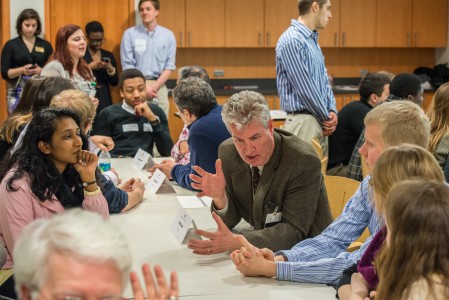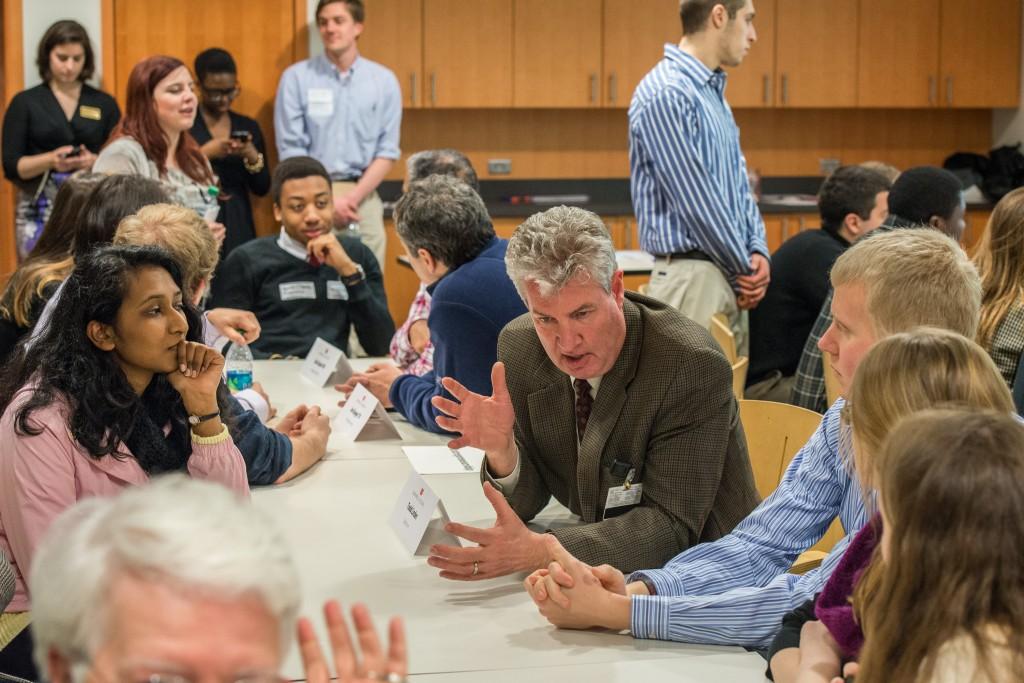On Thursday, Feb. 20 the Board of Trustees arrived on campus for a three-day session, which includes discussion of building renovation proposals and the student fee increase, among other topics.
The highest priorities on the agenda for this weekend involve facilities renovation projects. The Alumni Recitation Hall and Carnegie Hall have not been renovated in many years and will be the first ones to be considered.
“I will be putting forth a broad proposal for several stages of the next generation—meaning 10 to 20 years—of building and renovation on campus,” said President Raynard Kington. “We have buildings that span 100 years of [age].”
Kington hopes that, by the end of the weekend, the Board will be able to see a larger picture of how the buildings will be renovated. If all goes according to plan, the Trustees will vote on taking the first action for renovation when they meet again in May.

A second priority is the vote deciding how much student fees and tuition will increase for next year. This is a routine vote—the Board votes once every year to approve the annual fee for students.
“It’s going to go up,” Kington said. “The question is how much?”
Although the student fees will be increasing, Kington said he believes that Grinnell is relatively affordable compared to peer liberal arts colleges.
“Of our 16 peers, we’re near the bottom in terms of our fees. We will continue to be seen as a ‘best buy,’” he said.
He noted that the Board has always kept affordability as a top priority.
“When everyone else ramped up their fees years ago, we didn’t,” Kington said.
This Board meeting will include a dialogue about whether the Trustees are effectively meeting their goals and how they can improve from here. The Board members will be discussing and refining metrics to evaluate the progress of the Board and its committees.
This dialogue will touch upon the efficiency of nearly all the work implicated in the regular-functioning the College, such as recruitment, diversity and financial budget.
Also on the Trustees’ agenda is an update from Patti Crane of Crane MetaMarketing. Last semester, the College began the process of redefining the intuitional identity of the College in ways that would be attractive for prospective students and staff, while at the same time staying true to the values and legacy of the institution.
Crane most recently visited Grinnell in December to conduct a few more interviews and to lead workshops with the Admission and Communications staff on advertisement and marketing principles to enhance the campus experience. She will be presenting her most recent findings to the Trustees over the weekend.
SGA staff will also be presenting a report to the trustees on the development of the student body.
“We’re given a 15-minute time slot to do a presentation giving a general overview of our efforts … successes and setbacks,” said SGA President Thomas Neil ’14. “I think we’re going to be focusing on diversity and inclusion, accountability, internal and structural improvements. We’ve gone from 20 alcohol hospitalizations to four this year. We were obviously not the only actor within that situation, but I think it’s a testament to how we’ve thought about things, and the positive direction the school is moving in as a whole.”
Neil emphasized the continued importance of alumni engagement projects, both in the work specifically being done by Trustees and beyond.
“The greatest resources you have as a Grinnellian are your peers,” Neil said. “Students want to be connected to the larger alumni community; students want to be connected to what it means to be a Grinnellian. [The administration] is thinking about how to build a stronger alumni community, and I would really like Student Government to be a part of that.”
Some high-profile items of discussion at past Board meetings will not be brought up this weekend, such as the College’s wind turbine project and the debate on need-blind admission.
In February of 2012, the Board of Trustees initiated a series of studies dedicated to implementing a wind farm to supply power for the College. According the Grinnell Herald-Register, the predicted wind farm of three turbines would cost “$13 million and possibly [supply] as much as half the College’s power consumption.”
However, the project has taken longer than planned to carry out.
“It’s been incredibly slow, for lots of reasons,” Kington said. “We have to get easements in the property to run the wires, we had to get zoning changes and we had to get a road vacated. There are all these things that have to occur.”
The project will be unable to move forward until local officials approve certain actions.
“The local board did not vote on the zoning, so we don’t know … we think we’ll get it, but we don’t know,” Kington said. “There’s too much uncertainty, so we’re not bringing it forth at this Board meeting.”
Kington also said that the question of need-blind admissions—which the Trustees discussed in detail last March—will not be brought up this week. He cited the Trustees’ desire to wait for the statistics of next year’s incoming class before again tackling the issue in 2015.
“We’ll give some feedback of where we are in terms of admission and revenue, and how we’re doing with the budget,” Kington said. “We’ll have that discussion in more detail in the fall, when we have the new class come in and we actually see what the discount rate … and revenue is. The Board said it would come in and do another deep dive about the need blind [in fall of 2015].”
The College’s discount rate is a measure of its financial aid spending, derived by dividing aid granted by the comprehensive fee of attending Grinnell.
Remaining items for the weekend will involve hearing the agendas of each special committee of the College. There are nine trustee committees, each of which tackles an aspect of the College’s management, such as the Academic Affairs Committee, the Budget Committee, the Facilities Committee or the Trustees and Trustee Organization Committee.
Some of the agenda items are routine. The Board will approve the bachelor’s degrees for the students graduating at the end of the semester. Last semester, the Board approved the degrees for the students who graduated mid-year. Additionally, the Board will also be voting on whom to award honorary degrees, as well as to elect new Trustee members that the Trustees and Trustee Organization Committee have nominated.


































































